The Zealot in the Bible, Simon, intrigues with his mysterious past and fervent opposition to Roman rule, but who was he really?
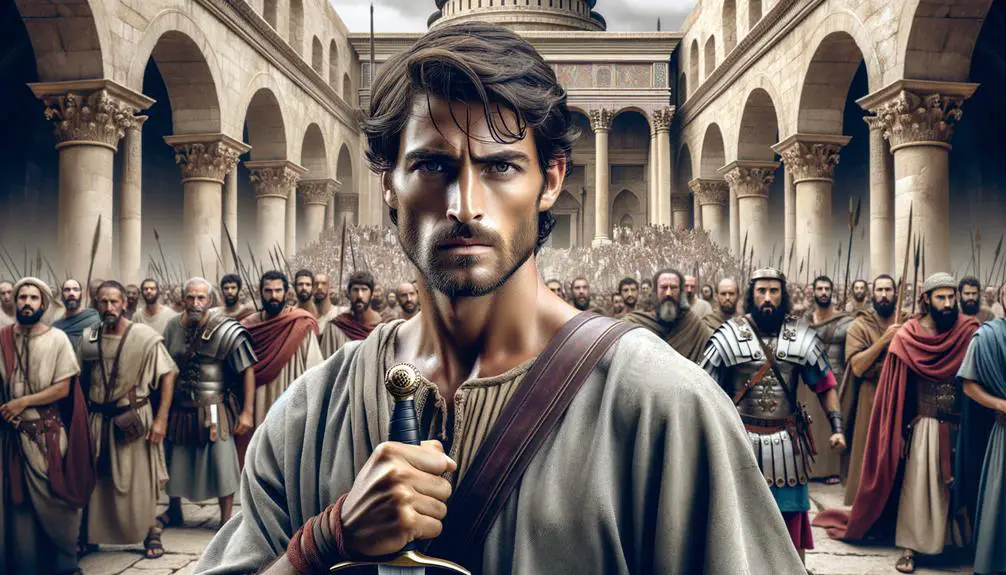
Who Was the Zealot in the Bible
You've likely heard theories swirling about Simon the Zealot, one of the lesser-known figures among Jesus' disciples. But who was he, really, and why does his title 'the Zealot' spark such intrigue?
Simon's moniker suggests a fiery passion and possibly a connection to the Zealot movement, a group known for their fervent opposition to Roman rule in Judea. However, the historical evidence remains tantalizingly vague, leaving much to speculation.
As you explore further, consider the implications of Simon's background on his contributions to the early Christian community and how his legacy continues to shape our understanding of this tumultuous period in history.
Key Takeaways
- The Zealot in the Bible, Simon, was a key figure in Jewish resistance against Roman occupation.
- Simon the Zealot transitioned from political activism to becoming a proponent of faith in early Christianity.
- His legacy symbolizes the balance between deep conviction and avoiding fanaticism in faith and societal engagement.
- Simon's story offers lessons on passionate faith, justice, and navigating the challenges of societal change.
The Historical Context
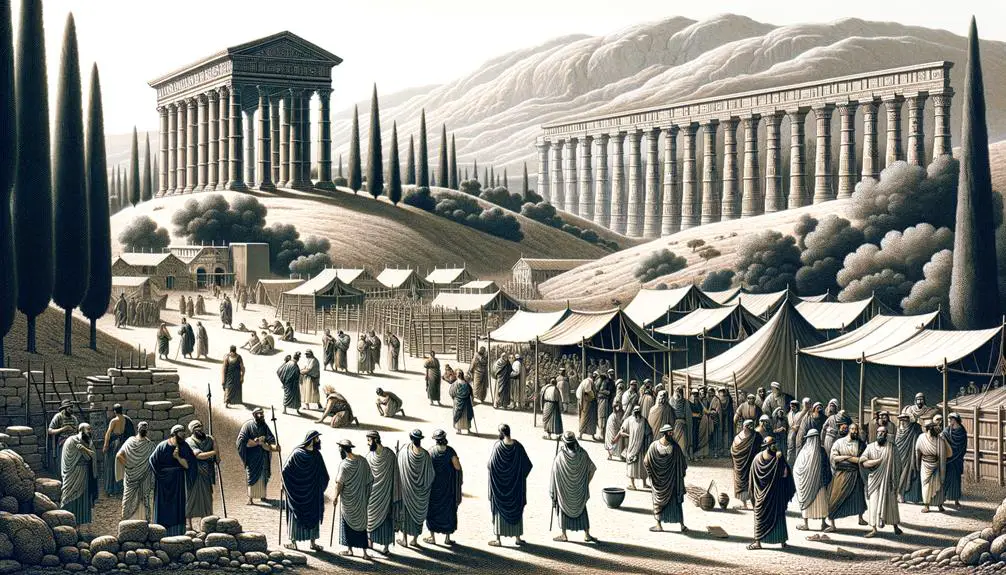
To fully grasp the role and significance of the Zealot in the Bible, it's essential to delve into the historical context of 1st-century Judea, a period marked by Roman occupation and Jewish resistance. This era was a crucible of political and religious turmoil, shaping the identities and destinies of those living under Roman hegemony. Understanding this backdrop is crucial to appreciating the motivations and actions of the Zealots.
The Roman occupation wasn't just a political takeover; it represented a profound cultural and religious clash with the Jewish population. The Romans imposed taxes, instituted governors, and sometimes interfered in the temple's affairs, actions that many Jews saw as direct affronts to their autonomy and beliefs. This friction gave rise to various forms of resistance, ranging from passive noncompliance to active rebellion.
Within this spectrum of Jewish resistance, the Zealots carved out a distinct identity. They weren't content with passive resistance or quiet dissidence. Instead, they advocated for and engaged in active rebellion against Roman rule. Their zeal for the Law and the sovereignty of their God drove them to extreme measures, including violence, to oppose what they saw as unlawful Roman dominion over God's chosen people.
The Zealots' actions and ideology were born out of a fervent desire to restore Jewish independence and ensure the purity of their faith, untainted by foreign rule. Their commitment to these goals, even at great personal risk, highlights the depth of the crisis of identity and faith that Jewish society faced under Roman occupation. Understanding this context illuminates the Zealots' complex role in the tapestry of 1st-century Judean society and their place in the broader narrative of Jewish resistance.
Simon the Zealot: An Overview
Amid the fervent resistance against Roman rule, Simon the Zealot emerged as a key figure whose actions and beliefs personify the Zealots' struggle for Jewish independence. His significance in history isn't merely due to his political inclinations but also because of his pivotal role among Jesus' disciples. Simon's identity is intertwined with the early Christian community and the Apostolic traditions that have shaped the faith's foundations.
Understanding Simon's identity involves delving into the complexities of first-century Judean society. Unlike other figures whose backgrounds might be more straightforward, Simon's zealotry suggests a fervor for Jewish nationalism and possibly a readiness to engage in radical actions against the Roman occupiers. This aspect of his personality provides a unique lens through which to view the diverse backgrounds of the disciples and their unified purpose under Jesus' teachings.
Apostolic traditions have painted Simon the Zealot in various lights, often emphasizing his dedication and zeal for the gospel. According to these traditions, Simon's fervor was redirected from a political to a spiritual battleground, where he became a passionate proponent of Jesus' message. His transformation from a political zealot to a spiritual advocate underscores a broader theme within the Christian narrative: the power of faith to transcend and transform societal and personal turmoil.
The Zealots: Origins and Beliefs
Understanding the Zealots requires tracing back to their origins in 1st-century Judea, where a deep-seated belief in Jewish nationalism fueled their resistance against Roman occupation. They emerged during a time of heightened political and religious turmoil, positioning themselves as fervent proponents of Jewish sovereignty. Their radical ideologies advocated for the use of violence if necessary, to overthrow their oppressors and reclaim autonomy over their homeland.
The Zealots' beliefs were profoundly rooted in the conviction that God alone was their ruler and sovereign. This belief system starkly contrasted with the prevailing acceptance of Roman rule among other Jewish groups, setting the Zealots apart as extremists in their quest for independence. They saw themselves as the defenders of the faith, ready to die for their cause rather than submit to foreign domination.
To grasp the essence of their movement, consider the following table, which summarizes key aspects of the Zealots' origins and beliefs:
Aspect |
Description |
Relevance |
|---|---|---|
Origins |
1st-century Judea |
Emerged as a response to Roman occupation |
Beliefs |
God as the sole ruler |
Rejected Roman authority, emphasizing divine sovereignty |
Methods |
Use of violence |
Advocated for aggressive actions against Roman forces |
Goal |
Jewish independence |
Sought to establish a sovereign Jewish state |
In analyzing the Zealots, it's evident that their combination of religious fervor and political activism formed the backbone of their identity. Their commitment to Jewish resistance and readiness to embrace radical ideologies for their cause underscores a significant chapter in the history of Jewish defiance against external control.
Simon's Role and Contributions
Building on the foundation of the Zealots' origins and beliefs, let's explore Simon's pivotal role in shaping the course of their movement and his significant contributions to their cause. Known as Simon the Zealot, his personality was marked by a fervent zeal not just for the political freedom of the Jewish people but also for the spiritual renewal under the banner of Jesus Christ. Unlike many of his contemporaries who might've focused solely on the overthrow of Roman rule, Simon's vision, as inferred from historical and biblical accounts, encompassed a broader, more encompassing liberation.
Simon's contributions to the early Christian movement were profound, especially considering the backdrop of his revolutionary zeal. His Apostolic travels, though not as extensively documented as those of Peter or Paul, were crucial in spreading the nascent Christian faith beyond the immediate confines of Judea. This aspect of his ministry demonstrates a remarkable transformation from a nationalist revolutionary to a proponent of a faith that welcomed all, irrespective of their ethnic or social backgrounds.
His journeying for the faith, leveraging his personality that was once rooted in zealotry, suggests a strategic amplification of the Christian message—bridging divides between diverse communities. This adaptability and fervor in Simon's character were instrumental in navigating the complex socio-political landscapes of the time, thereby contributing significantly to the establishment and spread of Christianity.
Legacy of a Biblical Zealot
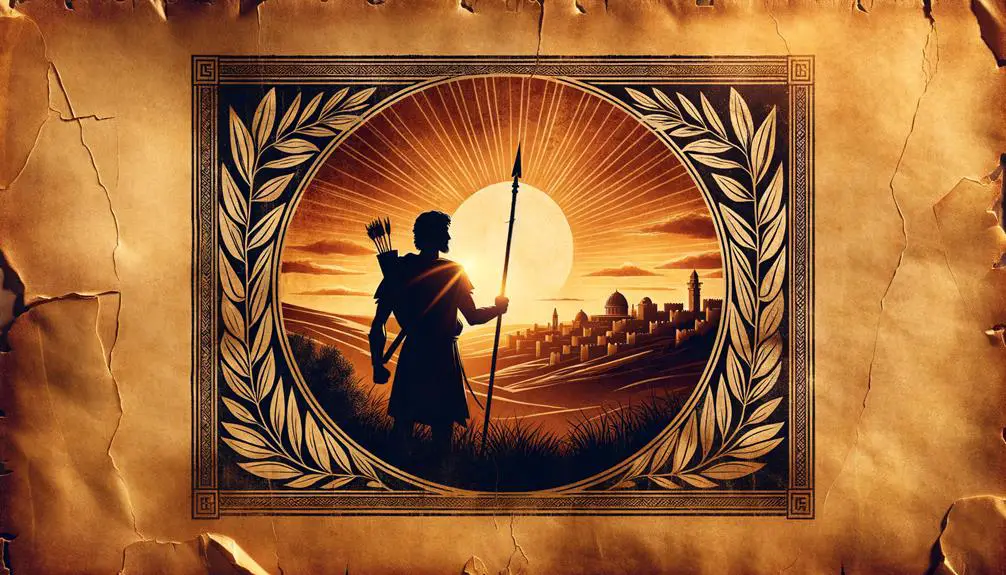
Simon the Zealot's legacy transcends his historical role, shaping modern interpretations of zeal and commitment within the Christian faith. His story, as one of the twelve apostles, offers insight into the complex interplay between religious fervor and political activism, a topic as relevant today as it was two millennia ago. Simon's embodiment of zealotry has evolved over time, reflecting broader shifts in societal values and theological understanding.
Zealot symbolism, deeply rooted in Simon's legacy, serves as a powerful metaphor for unwavering dedication to one's beliefs and causes. This symbolism has been interpreted in various ways, depending on the cultural and historical context. In contemporary discussions within Christianity, Simon's zeal is often cited as an exemplar of passionate faith and active engagement with societal issues, encouraging believers to take a stand for justice and truth.
Modern interpretations of Simon's legacy emphasize the balance between zeal for God and the practical implications of such zeal in the world. This balance is crucial in avoiding the pitfalls of fanaticism while still advocating for meaningful change. Scholars and theologians alike delve into Simon's story to extract lessons on how to navigate the fine line between conviction and intolerance.
Through the lens of history, Simon the Zealot teaches us about the power and potential dangers of zeal. His legacy challenges believers to reflect on how they can channel their passion for their faith into constructive and compassionate action. In this way, Simon's story remains profoundly relevant, inspiring modern Christians to consider how best to live out their convictions in an ever-changing world.
Frequently Asked Questions
How Do Modern Historians and Biblical Scholars Reconcile Discrepancies Between the Gospel Accounts of Simon the Zealot and Historical Records of the Zealot Movement?
You're diving into how experts tackle the differences between the gospel narratives of Simon the Zealot and the historical Zealot movement. They meticulously analyze Simon's motivations and the core of Zealot ideology, comparing these to historical facts.
This approach helps them understand the blend of religious fervor and political activism attributed to Simon. By doing so, they aim to bridge the gap between biblical depictions and historical accounts, offering a clearer picture of Simon's role and beliefs.
Are There Any Archaeological Findings That Specifically Relate to Simon the Zealot or Provide a Deeper Understanding of the Zealot Movement's Impact on First-Century Judea?
As you delve into the shadows of history, seeking traces of rebellion, you might wonder if there are Zealot artifacts that shed light on Judean politics.
Unfortunately, specific items linked directly to Simon the Zealot are elusive. However, discoveries related to the broader Zealot movement offer insights into its significant impact on first-century Judea.
These findings, while not personal belongings, help piece together the puzzle of this tumultuous period.
How Has the Portrayal of Simon the Zealot Evolved in Christian Art and Literature From the Early Christian Period to the Present Day?
You've seen how Simon the Zealot's depiction has shifted dramatically in artistic symbolism and literary motifs over centuries.
Initially, he was often represented with minimal distinction. However, as Christian art and literature evolved, he began to embody the zeal and fervor of his namesake more vividly. This shift reflects a deepening understanding and appreciation of his role, highlighting how interpretations and portrayals can evolve, enriching the narrative and engagement with historical figures.
What Are Some Common Misconceptions About the Zealots and Simon's Affiliation With Them That Persist in Contemporary Christian Teaching or Popular Culture?
You're barking up the wrong tree if you think Zealot origins and Simon's teachings are widely understood. Many believe Zealots were simply rebels, ignoring their complex political and religious motivations.
Similarly, Simon's affiliation is often oversimplified, neglecting the nuanced ways he might've engaged with their ideology. This misconception skews understanding, casting shadows rather than shedding light on the historical and theological underpinnings of these early Christian figures.
How Do Various Christian Denominations Today View Simon the Zealot's Legacy, and Does His Zealot Identity Influence the Theological Interpretations or Practices Within These Communities?
You'll find that Christian denominations vary in their reverence for Simon the Zealot's legacy. His identity as a zealot doesn't uniformly impact theological interpretations or practices.
However, aspects such as zealot rituals and Simon's martyrdom are sometimes highlighted, especially in discussions around faith and activism.
While some communities may emphasize his revolutionary spirit, others focus on his evangelistic zeal, showing how diverse the appreciation for his contributions can be.
Conclusion
In wrapping up, you've journeyed through the life of Simon the Zealot, a figure whose legacy dances on the edge of biblical history and fervent ideology. The Zealots, with their radical beliefs, carved a niche in the tumultuous era, with Simon playing a pivotal, though enigmatic, role.
His contributions, while not spotlight-stealing, underscore a nuanced chapter in the narrative of faith and rebellion. In essence, Simon's story is a historical tweet, brief but resonant, in the vast timeline of religious and political fervor.

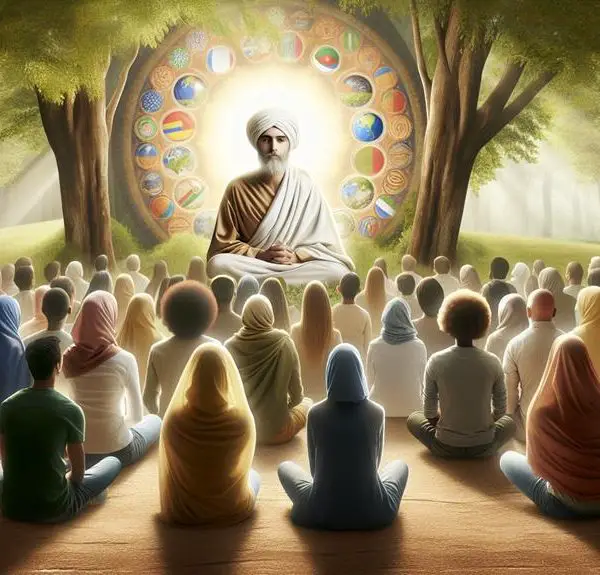
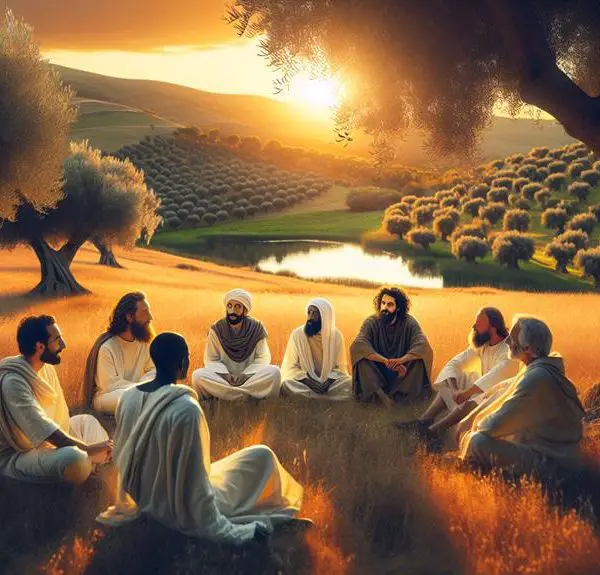
Sign up